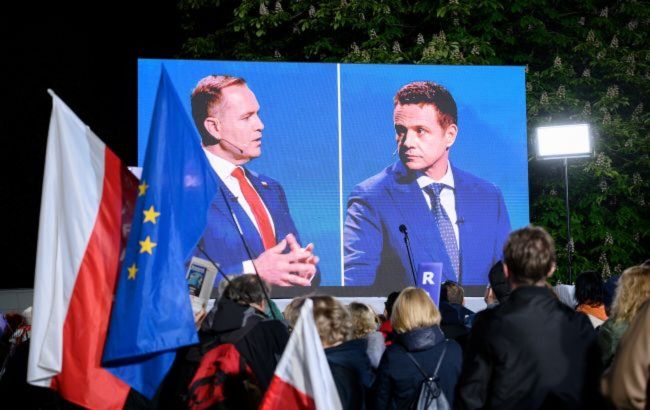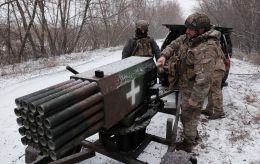Poland election runoff - Who leads and who poses risk to Ukraine
 First-round winners Karol Nawrocki and Rafal Trzaskowski (Photo: Getty Images)
First-round winners Karol Nawrocki and Rafal Trzaskowski (Photo: Getty Images)
First-round winners of Poland's presidential election, Rafal Trzaskowski and Karol Nawrocki, now face a tough battle for the votes of the eliminated candidates. It is these votes that will determine who becomes the country’s next president.
RBC-Ukraine explains which candidate has a better shot at winning the runoff - and what risks the outcome may pose for Ukraine.
According to exit poll data, the first round of the election was won by the pro-government Civic Platform candidate, Warsaw mayor Rafal Trzaskowski, who received 30.8% of the vote. In second place was Karol Nawrocki, supported by the opposition Law and Justice party and head of the Institute of National Remembrance, with 29.1%.
Such a narrow gap between them was one of the main surprises of the election. Polls before the vote had given Trzaskowski about a 5% lead over his opponent.
Final election results may differ somewhat from exit polls, but the first-round winners and general trends are already clear.
Given the minimal gap between Trzaskowski and Nawrocki, the deciding factor in the election will be the votes of those who supported other candidates in the first round.
Whose votes can Trzaskowski count on
First and foremost, Trzaskowski, candidate of the Civic Coalition, may win over supporters of other parties in the coalition. Notably, the Speaker of the Sejm and co-leader of the Third Way bloc, Szymon Hołownia, who, according to recent data, received 4.9% of votes - a surprisingly low result.
Additionally, Trzaskowski could gain some votes from Magdalena Biejat, leader of the Lewica party, part of the coalition, who got 4.1%.
The Warsaw mayor might also compete for the votes of another left-wing politician, oppositionist Adrian Zandberg, who received 5.2%.
Whose votes might Nawrocki count on
Nawrocki, in turn, may pick up votes from the third- and fourth-place finishers: Sławomir Mentzen (14.8%) and Grzegorz Braun (6.3%). Both belong to the far-right political spectrum. Mentzen leads Confederation, known for its anti-European and anti-Ukrainian stance. Braun is notorious for his anti-Ukrainian and anti-Semitic actions and eccentric ideas, including the proposal to restore monarchy in Poland.
The strong results of Mentzen and Braun were another surprise of the first round, revealing that over 20% of the Polish electorate supports far-right, anti-system, and even xenophobic ideas.
Thus, Trzaskowski will have to compete for the votes of left-leaning candidates over the next two weeks, while Nawrocki will fight for the far-right electorate, further polarizing Polish politics.
A worrying sign for Trzaskowski is that, despite his narrow first-round lead, combined with potential allies, his support in the runoff is lower than that of Nawrocki and his possible partners.
In conclusion, despite his relatively low result, less than 30%, Nawrocki’s chances in the second round look slightly better.
Why ratings don't add up
Of course, simply adding up candidates’ ratings only provides a rough picture of the runoff. Not all voters of losing candidates will necessarily support the ideologically closest candidate in the second round; many will simply abstain.
This is confirmed by pre-election polls. For example, only 68% of Mentzen’s supporters said they were likely to back Nawrocki in the runoff. Nearly the same share of Zandberg’s voters said they would support Trzaskowski.
It will also be important whether losing candidates publicly endorse anyone in the runoff or leave the decision to their voters.
Is there danger for Ukraine
Neither runoff candidate, Trzaskowski nor Nawrocki, can be called anti-Ukrainian or pro-Russian. Therefore, Poland turning into a new Hungary or Slovakia regardless of the outcome is unlikely.
While Trzaskowski has consistently expressed a pro-Ukrainian stance, promising support and condemning Russian aggression (except for a scandal over a "buffer zone"), Nawrocki’s position on Ukraine is more ambiguous. He has condemned Russian terror but has also blamed European elites in part and repeatedly voiced historical grievances toward Ukraine.
Therefore, Nawrocki’s possible victory raises more concerns. Especially because to win over the far-right electorate of Mentzen and Braun, he might adjust his policy in an anti-Ukrainian direction.
However, the bigger impact of Nawrocki’s win would be on Poland’s domestic politics. The confrontation between Donald Tusk’s government and the president would become even more intense than it is now, with Andrzej Duda from the same Law and Justice party as president.
Nawrocki’s potential victory, combined with poor results from ruling coalition members, could even trigger a parliamentary reshuffle or a coalition with far-right groups. This scenario would seriously threaten Ukraine, though it is too early to fully assess this risk.
RBC-Ukraine has previously detailed Rafal Trzaskowski’s biography and views.

